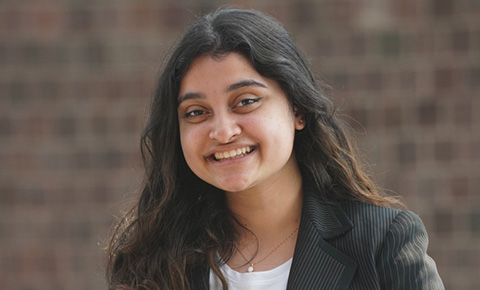Shining a Light on Bangladeshi Student Protests

The violence in Bangladesh during student-led anti-government protests in August deeply affected Adrija Bhattacharjee, a graduate student at Northwestern University's School of Education and Social Policy. Heartbreaking stories haunted her: a father searching for his son’s whereabouts, a graduate student shot while delivering water to protesters, and a young girl killed by a stray bullet.
“What is gutting is that I see myself in these protesters,” Bhattacharjee said. “We speak the same language; we look the same. The only difference is where I live.”
Bhattacharjee, a first-generation Bangladeshi American from New Orleans pursuing a master’s in higher education administration and policy, felt compelled to act. Horrified by the violence and the lack of awareness, she organized a lecture for the Northwestern community.
In the webinar and an interview with the School of Education and Social Policy, she outlined the historical context of the crisis in Bangladesh and shared her SESP experience. She also created a list of resources for locals and ideas for supporting the Bangladeshi people.
“Bangladesh is a nation founded on student protest,” she explained, referencing the period when students fought against the imposition of Urdu as the national language under Pakistani rule. Many protesters were injured or killed, but they succeeded in their goal, cementing protest as a vital aspect of Bengali culture. “From the start, I want to emphasize the importance of student protests in Bangladesh,” she said.
While Bhattacharjee feels hopeful about the new government, she emphasizes the need to protect Bengali religious minorities. After the protests, former Prime Minister Sheikh Hasina fled to India, and Nobel Laureate Muhammad Yunus became the interim leader. Although this change appears positive for protesters, Bhattacharjee is concerned about the Awami League—formerly committed to protecting minorities—no longer being in power. “This is a win, but we must stay focused,” she said. “The students' hearts are in the right place.”
Still, reckoning with the violence from afar left Bhattacharjee grappling with anger and fear. “I saw videos of women my age getting assaulted,” she reflected. Feeling isolated because many classmates were uninformed about Bangladesh, she often broke down. “I’d play music or a TV show in the background to drown out my thoughts. I wondered, ‘Do you even care?’”
After sharing her experiences, Bhattacharjee felt emboldened to educate her peers. Living in the U.S. allows her to use her voice without fear—a privilege she feels obligated to exercise. “If I were still there, my activism could lead to death or worse,” she said. “It's a privilege to protest here.”
With that privilege, she decided to engage the Northwestern community, hoping to inspire awareness and change. “The people around me are well-intentioned,” she said. “I thought, why not try?”